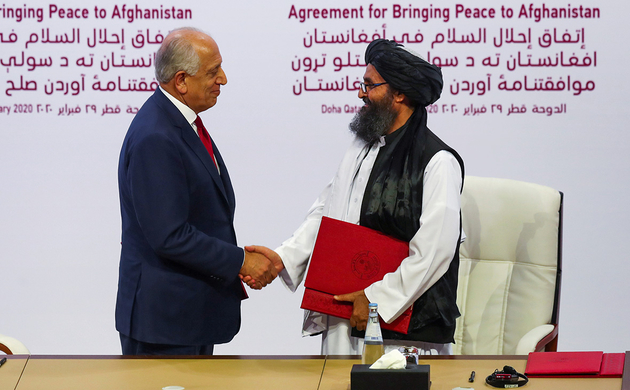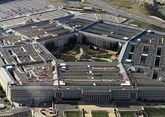On February 29, the United States signed a conditional peace agreement with the Taliban movement (banned in Russia). The signing ceremony took place in Qatar's capital Doha. It was attended by representatives of about 30 states and international organizations. American troops are expected to leave Afghanistan. In any case, U.S. President Donald Trump said so. The document was signed by U.S. Special Representative for Afghanistan Reconciliation Zalmay Khalilzad and Taliban's political office chief, Mullah Abdul Ghani Baradar.
It was expected that the agreement would be signed by U.S. Secretary of State Mike Pompeo, however, he limited himself to speaking at the signing ceremony. Pompeo recalled the Taliban’s promise to cut ties with al-Qaeda and urged to support fight against ISIS (both groups are banned in Russia). In turn, Mullah Baradar said that the movement will adhere to agreements with the United States, and described the signing of the agreement as a "great achievement" of the Taliban. Taliban chief negotiator, who is also the head of Taliban's office in Qatar, Sher Mohammad Abbas Stanikzai said that this is a day of victory." "Victory has come with the help of God," Stanikzai said. He expressed hope that Afghanistan will be governed according to 'Islamic principles' due to the agreement and called on the Taliban to take an active part in the reconstruction of the post-war country.
February 29 was a big day for the United States as well. According to them, the agreement was a major step towards ending the 19-year war in Afghanistan. "The end of the war in Afghanistan, which has began almost immediately after the 9/11 terrorist attacks and cost the U.S. 2,400 personnel lives and nearly $1 trillion, glimpsed. Trump, unlike his two predecessors, George W. Bush and Barack Obama, managed to ignite "the light at the end of the tunnel" in this conflict for Americans - and now basks in his glory and applause," Deputy Director General of the Moscow Center for Strategic Assessments and Forecasts Igor Pankratenko told Vestnik Kavkaza.
As for Kabul, and Afghanistan as a whole, their prevailing mood is not so rosy. For President Ashraf Ghani, the peace deal with the Taliban and the withdrawal of U.S. troops from Afghanistan could result in a loss of power.
"The peace agreement" provides for the beginning of a political settlement in Afghanistan. It is expected that the foreign troops will gradually leave Afghanistan within 14 months, as certain provisions of the agreement are implemented. According to Donald Trump, the withdrawal of troops will begin immediately. At the same time, he stressed that "if bad things happen," the U.S. will go back. He also said he would be personally meeting leaders of the Taliban in the near future. At the initial stage, the deal involves inter-Afghan talks, prisoner releases from both sides and a ceasefire.
In particular, the deal sets the beginning of talks for 10 March, provided that up to 5,000 Taliban prisoners are released by the Afghan government by that time in order to strengthen confidence between the parties.
However, on March 1, Ashraf Ghani has rejected demands to release 5,000 Taliban prisoners. He noted that the release of the Taliban prisoners cannot be a precondition and should be discussed during the talks," 1TV Afghan channel reports. Ghani believes that there is no guarantee that the released militants will not return to the battlefield. "It is the responsibility of the Afghan government and not of the United States to release prisoners," Ghani stressed at a press conference in Kabul.
The problem is that the agreement was signed between the Taliban and the Americans. The Afghan government turned out to be a spare part. Therefore, according to Pankratenko, the U.S. agreement with the Taliban does not exclude an escalation of the conflict. "There was an unpleasant experience - after the departure of Soviet troops in 1989, the civil war broke out anew, because no one wanted to negotiate, everyone considered himself stronger than the other, both President Najibullah and Mujahideen leaders. And now every local chief appointed by Kabul, considering some province, county or kishlak to be his own feudal allotment, is worried about how to preserve what has been won with blood, intrigue, or bakshish. And every Taliban field commander, which also has his own 'patrimony', dreams of what can be added to his wealth - of course, at the expense of 'an accomplice of the invaders'," Pankratenko said.








